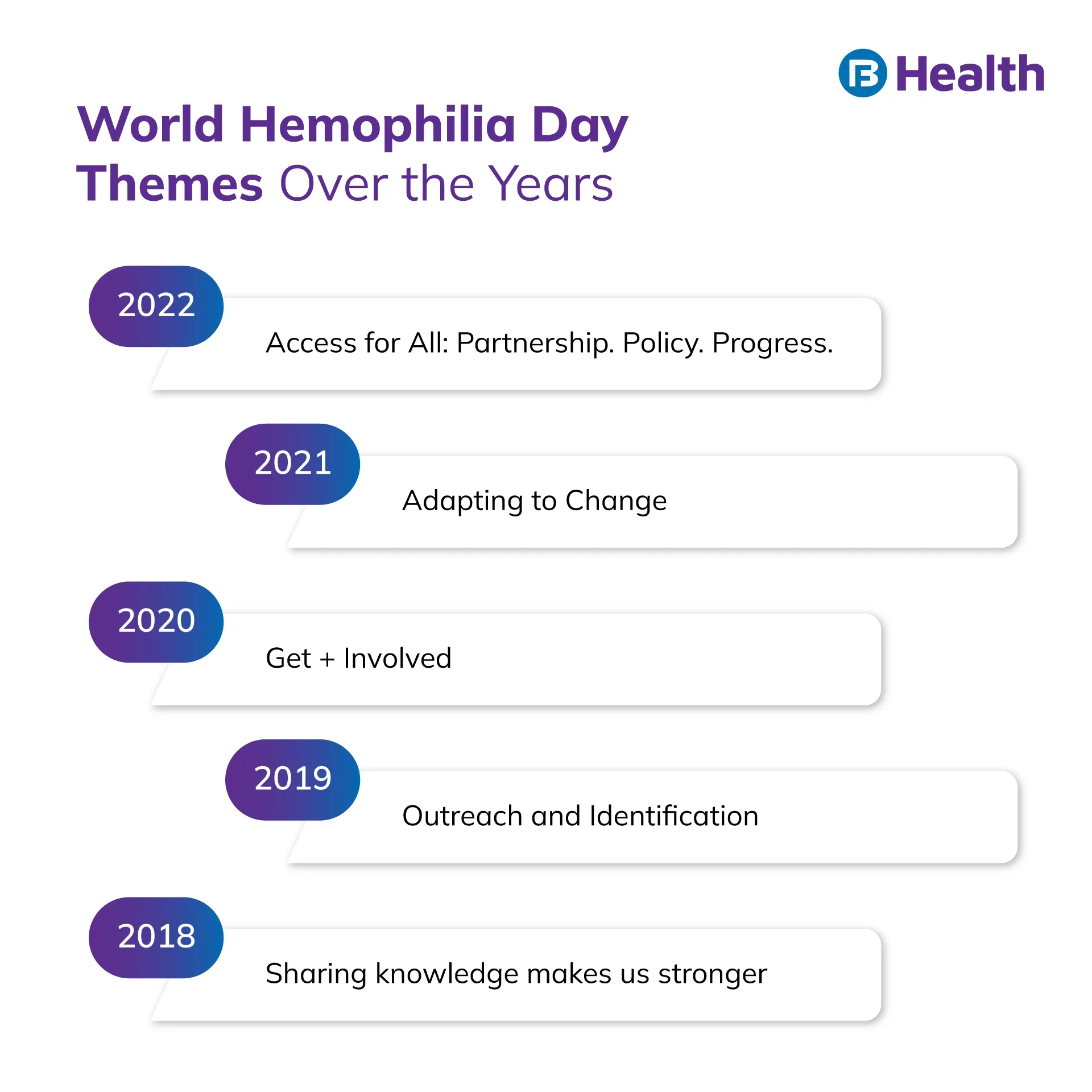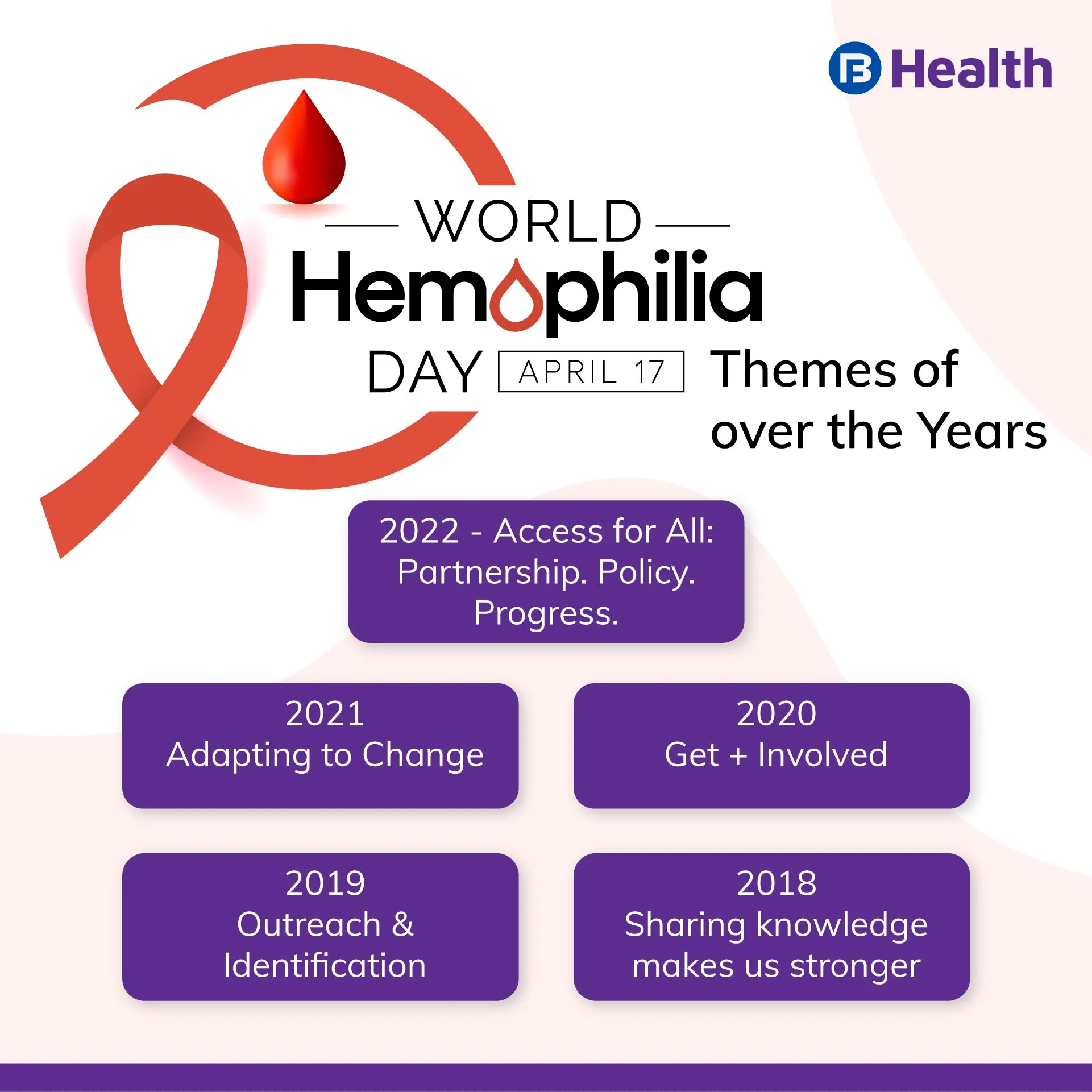General Health | 5 min read
World Hemophilia Day: Causes, Symptoms, and Treatments
Medically reviewed by
- Table of Content
Key Takeaways
- World Hemophilia Day is celebrated on April 17 every year
- World Hemophilia Day 2022 theme is “Access for All”
- Bleeding and bruising are common symptoms of hemophilia
The function of the X chromosome is to provide instructions for making clotting proteins that form a blood clot. Hemophilia is generally a result of mutation of that chromosome. This mutation occurs in the X chromosome that you acquire from your parents. In this condition, your body will not be able to clot the blood, so injuries will result in extensive bleeding [1].
Hemophilia is a rare genetic condition that may become life-threatening if left untreated. Despite the severity, there isn’t much awareness about this condition. To improve this aspect, World Hemophilia Day is celebrated on April 17. Apart from making people aware of hemophilia, this day also aims to spread awareness about other bleeding disorders. This day has been celebrated every year since 1989.
World Hemophilia Day 2022 theme is “Access for All: Partnership. Policy. Progress.” [2]. This involves bringing bleeding disorders into national health policy by getting the attention of policymakers. This can only be possible by raising awareness. Read on to know more about hemophilia and how World Hemophilia Day 2022 will be celebrated.
How will World Hemophilia Day 2022 be celebrated?
To celebrate World Hemophilia Day 2022, the World Federation of Hemophilia (WFH) has planned several activities and has prepared campaign materials, advocacy toolkits, and social media content. For example, you can share your story if you or someone close to you has suffered from a blood-related disorder. WFH has also identified landmarks across countries for its ‘Light It Up Red!’ campaign. All these landmarks will light up on April 17, 2022, in the name of World Hemophilia Day. All these will help to propagate the central theme around which WFH wants to raise awareness.
Additional Read: World Immunization Day
What are the symptoms of hemophilia?
The symptoms of hemophilia are largely dependent on how severe your condition is. In mild cases, you may not experience a severe bleeding episode for a prolonged period [3]. But severe symptoms may become more common as the severity of your condition progresses. Given below is a list of symptoms:
- Unprompted and unexplained nosebleeds
- Bruises everywhere around your body
- Bleeding from your mouth and gums
- Easily bruising or hematomas
- Dental bleeding (in mouths or gums)
- Blood in the urine and stool
- Bleeding after a medical procedure
- Deep and easy bruising on impacts
- Excessive bleeding following a trauma or surgery
Symptoms of a person with mild hemophilia generally go unnoticed till adulthood. In moderate cases, doctors usually identify hemophilia as early as between 5 to 6 years of age. Commonly doctors diagnose hemophilia in infancy during circumcision.
If you have severe hemophilia, your body is extremely vulnerable to bleeding episodes. Although it is rare, severe cases can cause bleeding in the brain at just a slight impact. Without treatment, hemophilia can lead to other health conditions that can impact your mobility. One such condition is arthritis which may be a result of bleeding in joints.

What are the causes of hemophilia?
Hemophilia is mainly an inherited condition and is more common in men than in females. The reason behind this is the number of X chromosomes present in their bodies. As mentioned above, a mutation in genes leads to hemophilia. These genes are responsible for regulating the development of clotting factors that can help prevent excessive bleeding and heal wounds. As a result, a mutation can cause this bleeding disorder. The genetic factor of men increases their chances of having hemophilia to 50%, whereas women have a higher chance of being carriers rather than developing the condition.
Although it is a genetic condition, there are cases where hemophilia can occur even if no one in your family has previously had it. This is known as acquired hemophilia. Acquired hemophilia is an autoimmune condition. In this, your immune system attacks clotting factors and leads to hemophilia. It is generally associated with cancer, reaction to certain drugs, MS, pregnancy, and other autoimmune conditions.
Additional Read: World TB DayWhat is the diagnostics procedure for hemophilia?
This disorder is diagnosed by
- Reviewing the symptoms
- Doing clinical evaluation with diagnostics tests like blood test
- Reviewing personal medical history
It is likely that if you have bleeding problems or doctors suspect you have hemophilia, they will ask to see your personal and family medical history and perform a blood test to identify the type of hemophilia.
How is hemophilia treated?
The best way to treat hemophilia is to substitute the missing blood clotting factor with commercially prepared concentrates so that the blood in your body can clot in the normal way. This procedure is performed by administering the concentrates through your vein. If you are suffering from hemophilia, you can learn to perform these kinds of infusions on yourself so that you can stop the bleeding episodes without any external help. To get started with your treatment, visit a specialist doctor where you can get comprehensive care and lifestyle advice.
Additional Read: World Autism Awareness DayThis World Hemophilia Day, make sure you spread awareness about this disease to your near and dear ones. You can also book an online doctor consultation on Bajaj Finserv Health to know more about this disease. To maintain good health, start taking measures without delay.
- References
- https://www.cdc.gov/ncbddd/hemophilia/facts.html
- https://wfh.org/world-hemophilia-day
- https://rarediseases.org/rare-diseases/hemophilia-a/
- Disclaimer
Please note that this article is solely meant for informational purposes and Bajaj Finserv Health Limited (“BFHL”) does not shoulder any responsibility of the views/advice/information expressed/given by the writer/reviewer/originator. This article should not be considered as a substitute for any medical advice, diagnosis or treatment. Always consult with your trusted physician/qualified healthcare professional to evaluate your medical condition. The above article has been reviewed by a qualified doctor and BFHL is not responsible for any damages for any information or services provided by any third party.




